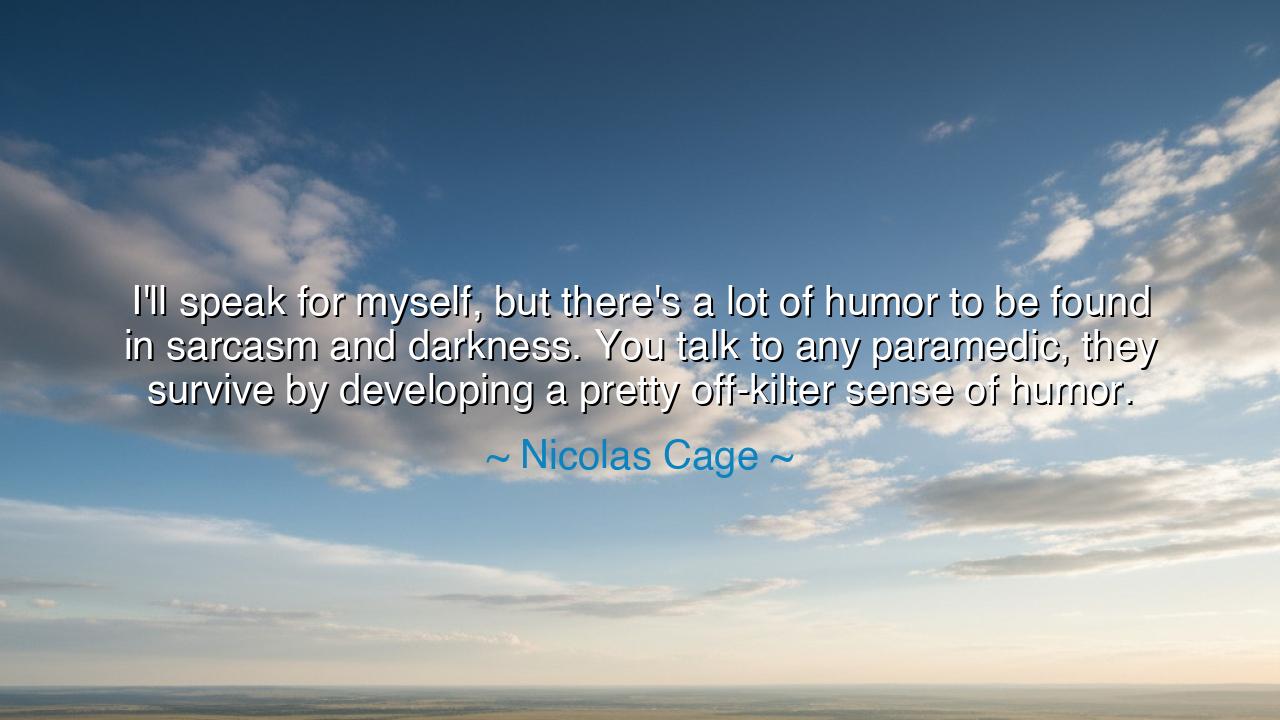
I'll speak for myself, but there's a lot of humor to be found in
I'll speak for myself, but there's a lot of humor to be found in sarcasm and darkness. You talk to any paramedic, they survive by developing a pretty off-kilter sense of humor.






“I'll speak for myself, but there's a lot of humor to be found in sarcasm and darkness. You talk to any paramedic, they survive by developing a pretty off-kilter sense of humor.”
Thus spoke Nicolas Cage, a man of contradictions — fiery and reflective, intense and compassionate — whose words unveil a timeless truth: that even in the darkness, there lives a form of laughter, and that humor, though strange and sharp-edged, is often the only shield the soul possesses against despair. His reflection is not one of cynicism, but of survival — a recognition that to look upon the abyss and still find reason to smile is one of humanity’s most ancient acts of courage.
To find humor in darkness is not to mock suffering, but to wrestle with it — to reclaim from sorrow a measure of strength. The paramedic, whom Cage invokes, stands daily at the border between life and death. They see what others cannot bear, they hear what others pray never to hear. Yet they endure, not by becoming cold, but by transforming their pain into a strange kind of laughter. This off-kilter humor is not callousness — it is the laughter of warriors, the laughter of those who have seen too much and must laugh lest they weep. It is the soul’s rebellion against the cruelty of fate.
This truth was known to the ancients. In the ruins of old Athens, soldiers returning from war would jest in the marketplace about wounds and death, and their laughter was not sacrilege, but catharsis — a purging of grief through shared absurdity. Even in tragedy, Aristophanes taught, there is room for comedy, for both are born of the same source: the awareness that life, in all its grandeur and fragility, is unbearably human. So too do modern healers — the doctors, firefighters, and soldiers of our age — use humor as the last defense of their sanity. It is not the humor of the naive, but of the wise — the laughter that arises not from ignorance, but from the deepest understanding of pain.
Cage’s words also speak to the nature of sarcasm, that ancient and misunderstood art. True sarcasm is not cruelty, but a mirror of truth turned sideways. It is the voice of the wounded who yet refuse to be silenced. Sarcasm, when born of experience, becomes a language of resilience — the way one mocks despair to rob it of its sting. The “off-kilter” humor of those who face death is precisely this — a way of speaking to tragedy on one’s own terms. To laugh in the presence of darkness is to say, “You may touch my life, but you will not take my soul.”
Consider the story of Viktor Frankl, the psychiatrist and survivor of the Nazi death camps, who wrote that even in the camps, men would make jokes — about the absurdity of fate, the strangeness of their suffering, the irony of their survival. It was not denial, but defiance. Their laughter was a whisper of freedom in a place designed to erase all humanity. “Humor,” Frankl said, “was another of the soul’s weapons in the fight for self-preservation.” Nicolas Cage’s insight, though born in modern speech, echoes this same ancient wisdom — that laughter, even dark laughter, is the breath of the unconquered spirit.
The origin of Cage’s reflection lies in his encounters with roles and worlds that tread the line between chaos and meaning. As an actor who has portrayed men haunted by violence, trauma, and existential struggle, he has looked into the darker corners of human nature. Through his craft, he has glimpsed what paramedics and soldiers know well — that the only way to survive the unbearable is to transform it into something absurd, to find a crooked smile where tears once were. In this sense, Cage’s humor is not entertainment, but alchemy — turning fear into endurance, pain into paradox, and despair into something that can be borne.
So let this teaching be carried forward, as wisdom for all who walk through shadow:
-
Do not fear dark humor, for it is the laughter of the brave. It does not deny sorrow; it redeems it.
-
Find strength in irony, for it allows the heart to look upon suffering and still choose defiance.
-
Honor those who laugh amid pain, for they have seen the edge of the abyss and returned with light.
-
Let your humor be compassion’s twin, never mocking the broken, but standing with them against despair.
Thus spoke Nicolas Cage, and through him the ancient truth resounds once more: that humor, even when dark, is not corruption but courage. It is the fire that flickers in the heart when all else grows cold, the whisper of humanity that endures through chaos. O listener, remember this — when the world grows heavy and grief seems too vast to bear, find your laughter, even the strange, crooked kind. For in that laughter lies defiance, and in defiance, the enduring strength of the soul.






AAdministratorAdministrator
Welcome, honored guests. Please leave a comment, we will respond soon